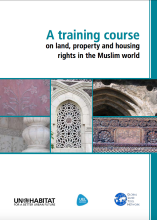/ library resources
Showing items 1 through 9 of 44.This training course from the Global Land Tool Network is part of the Network’s activities on Islamic dimensions of land. In most Muslim countries, Islamic law, principles and practices make an important contribution to shaping access to land.
This publication, from the Global Land Tool Network, presents a mechanism for effective inclusion of women and men in land tool development and outlines methodologies and strategies for systematically developing land tools that are responsive to both women and men’s needs.
This booklet arises from GLTN's work on Islamic dimensions of land which began in 2004 with the commissioning of research leading to Sait and Lim’s “Land, Law and Islam: Property and Human Rights in the Muslim World” (London: Zed Press/UN-Habitat, 2006).
This booklet arises from GLTN's work on Islamic dimensions of land which began in 2004 with the commissioning of research leading to Sait and Lim’s “Land, Law and Islam: Property and Human Rights in the Muslim World” (London: Zed Press/UN-Habitat, 2006).
This booklet arises from GLTN's work on Islamic dimensions of land which began in 2004 with the commissioning of research leading to Sait and Lim’s “Land, Law and Islam: Property and Human Rights in the Muslim World” (London: Zed Press/UN-Habitat, 2006).
Land and Property Tax: a Policy Guide is a companion for government officials and land and property professionals seeking to understand how to establish a viable and vibrant land-based taxation system.
The following recommendations are made in this report:
1. The continuum of land rights is a metaphor, not a theory. A metaphor can be applied in a number of theoretical contexts, whereas a theory has an ideological perspective.
This paper examines the effect of climate change on pastoralist conflict in Africa. The rangelands of East Africa is particularly vulnerable to drought, which is associated with climate change.
This paper explores the impact of natural resources on development. It uses new data on natural resources to show that, contrary to the popular ‘resource curse’ hypothesis, resource abundance in itself is not negative for a country’s economy.
Pagination
Land Library Search
Through our robust search engine, you can search for any item of the over 73,000 highly curated resources in the Land Library.
If you would like to find an overview of what is possible, feel free to peruse the Search Guide.








